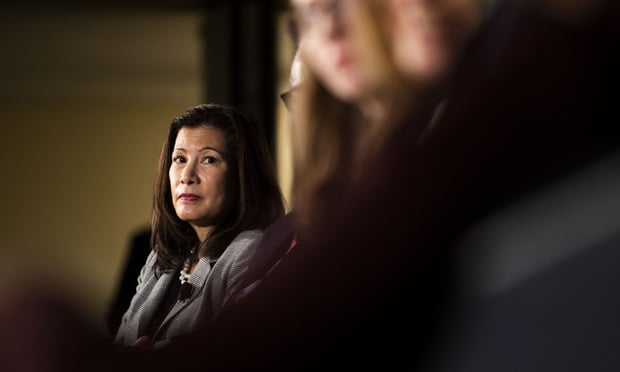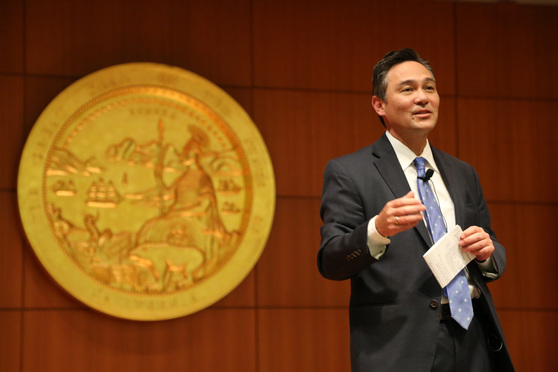Closures and Continuity: California's Courthouses Face Coronavirus Threat
Contra Costa County Superior Court leaders announced that its courthouses will close for a 12-day hiatus starting March 16. At the Sacramento County Superior Court, however, it appeared business as usual on Friday.
March 13, 2020 at 05:35 PM
7 minute read
 Tani Cantil-Sakauye, Chief Justice of California. Credit: Diego M. Radzinschi / ALM
Tani Cantil-Sakauye, Chief Justice of California. Credit: Diego M. Radzinschi / ALM
A more up-to-date list of court closures and disruptions is available here.
Updated at 3:58 p.m. PT
SACRAMENTO — Schools have shuttered. Workplaces are empty. Even the Sacramento Kings, who play in an arena just a few blocks away, have postponed games because of the coronavirus.
At the Sacramento County Superior Court, however, it appeared business as usual on Friday. Lawyers and litigants streamed in and out of the downtown courthouse without masks, advisories or any sense of alarm.
Meanwhile, 60 miles away, Contra Costa County Superior Court leaders announced that its courthouses will close for a 12-day hiatus starting March 16.
"This closure is not in response to a specific notice of exposure at any court facility or to any court staff," a statement issued by the court said. "Instead, it is in an abundance of caution to help limit the spread of the virus and the potential for future exposure."
Thee trial court was one of three that had sought emergency relief from Chief Justice Tani Cantil-Sakauye as of Friday.
Santa Clara County Superior Court also announced on Friday that it would reschedule small claims matters, most traffic and guardianship proceedings, and many civil and criminal trials that haven't started. The court hopes to resume normal operations on April 6.
And in San Mateo County, Presiding Judge Jonathan Karesh said his court is awaiting a relief order from the chief justice that will extend case deadlines, allowing leaders to keep workers, jurors and parties at home. Karesh said Friday that he expects more details to be released by Monday.
"There are going to be some significant changes to calendars," he said.
The different responses reflects the unusual power dynamic that has existed since county-based trial courts became state entities more than two decades ago. Locally elected judges retain a good deal of decision-making authority. Their independence, however, though limited, challenges any attempt at uniform, statewide directives.
Gov. Gavin Newsom issued an emergency order this week barring large public gatherings in an attempt to slow the virus's spread. Still, jurors, litigants and defendants continue streaming through courthouse doors. Court leaders say they're providing near-normal operations while offering to reschedule jury service and encouraging parties to use teleconference technology when possible.
On Friday, Sacramento Superior Court Judge Lawrence Brown sat on the bench in Department 8, directing a fast-moving calendar of alleged probation violations and pleas. A well-practiced group of lawyers strode around the well, consulting in low tones with defendants and moving in and out of the second-floor courtroom.
A public defender guided a slumping, sniffling woman to the lectern. Any other time, such symptoms might be attributed to the common cold or the plentiful pollen wafting from trees in spring bloom. On Friday they attracted only concern.
"Let's get you out of here," Brown said. He set an April appearance and within seconds the woman was headed toward the door.
"Ma'am!" the public defender shouted, stopping her to deliver a yellow sheet. "Here's your paperwork. Go downstairs, get that taken care of, go home and get well."
The scene is similar to ones playing out throughout California, as judges, attorneys, bailiffs and court employees strive to keep the justice system working even as the rest of society shuts down.
Three Courts Seek Emergency Relief
Cantil-Sakauye has broad powers in the event of an epidemic to move trial court sessions, to transfer civil cases and even to extend deadlines in criminal matters.
"Each court has different challenges and is working with local stakeholders to craft the best protections," Cantil-Sakauye said in a prepared statement issued Friday afternoon. "Many courts are using their authority to modify practices or extend timelines, and some are appropriately requesting emergency orders from me to support their local needs."
As of early Friday afternoon, three courts—Contra Costa, San Mateo and Ventura—had submitted emergency requests seeking relief, Judicial Council spokesman Cathal Conneely said in an email.
The requests generally involve closing courts and courtrooms or extending deadlines, including perhaps postponing jury trials, he said.
"The requests are currently being reviewed and evaluated on the merits—that review will determine any action on the request for emergency relief," Conneely said.
Representatives of Ventura and San Mateo county courts did not immediately return messages Friday afternoon.
The statement issued by Contra Costa court leaders said in-custody arraignments will continue at the Martinez courthouse, although the building will be closed to the public. Scheduled hearings will be reset. Jurors scheduled to appear in court Monday were asked to go to the courthouse for additional instructions. The Judicial Council, the administrative arm of the branch, has not issued any directives for dealing with the outbreak. Branch leaders say that's not its role.
"Each of the various levels of courts in the Judicial Branch are independent constitutional entities and manage their own court operations—the Judicial Council has been acting as an informational clearinghouse providing guidance from local, state, and national health agencies as the epidemic evolves," Conneely has written in emails to reporters.
Administrators did give courts draft updates Tuesday to a 2006 guidebook for handling epidemics. Administrative Director Martin Hoshino also sent a letter to court executives and presiding judges Thursday reminding them about updates and operations guidance available on an internal server.
"If ever there were a time to be flexible and forgiving and to come together, this would be it," Hoshino wrote. "We appreciate that this is uncharted territory. We are all working toward the same goal of maintaining government operations while acting to protect the health and safety of everyone."
 Martin Hoshino, administrative director of the Judicial Council.
Martin Hoshino, administrative director of the Judicial Council.Outside of Department 8 on Friday morning, in Sacramento, there were no visible signs of coronavirus concerns, save for a hallway sign advising ways to stop germs from spreading and a dripping hand-sanitizer dispenser on the wall. But there was plenty of COVID-19 talk in the galleries, hallways and chambers.
"They canceled my daughter's softball game," one lawyer told another. "They're closing the schools. You know quarantines are gonna be next," a visitor said to a nodding woman.
Russell Miller, a criminal defense attorney who's still not afraid of shaking hands, walked out of the courthouse, wondering what will happen to the felony trial he has scheduled next week. Some 95 prospective jurors are supposed to return Monday, but already some have called with concerns and outright objections about going to the courthouse.
Everyone involved with the case has been "thoughtful and understanding" about the situation, he said. And no one expects a landslide of panicked jurors, he added.
But "there is also a concern that the court may experience more objections for service as the trial progresses," he said.
Read more:
Coronavirus, This Recession and How Law Firms Need to Plan Now
California Courts Have Epidemic Playbook as Coronavirus Spreads
Judges Take Measures as the Northern District of California Remains Open
Cancellations, Crisis Planning and Clorox: COVID-19 Strikes Legal Community
Coronavirus Chills West Coast's In-House Hiring Market Following 2019 Surge
More Big Law Firms Respond as the Coronavirus Continues to Spread Globally
NOT FOR REPRINT
© 2025 ALM Global, LLC, All Rights Reserved. Request academic re-use from www.copyright.com. All other uses, submit a request to [email protected]. For more information visit Asset & Logo Licensing.
You Might Like
View All
Climate Disputes, International Arbitration, and State Court Limitations for Global Issues
![Judicial Face-Off: Navigating the Ethical and Efficient Use of AI in Legal Practice [CLE Pending] Judicial Face-Off: Navigating the Ethical and Efficient Use of AI in Legal Practice [CLE Pending]](https://images.law.com/cdn-cgi/image/format=auto,fit=contain/https://images.law.com/contrib/content/uploads/sites/276/2024/10/Image-request_767x633pxl.jpg)
Judicial Face-Off: Navigating the Ethical and Efficient Use of AI in Legal Practice [CLE Pending]
4 minute readTrending Stories
- 1Doug Emhoff, Husband of Former VP Harris, Lands at Willkie
- 2LexisNexis Announces Public Availability of Personalized AI Assistant Protégé
- 3Some Thoughts on What It Takes to Connect With Millennial Jurors
- 4Artificial Wisdom or Automated Folly? Practical Considerations for Arbitration Practitioners to Address the AI Conundrum
- 5The New Global M&A Kings All Have Something in Common
Who Got The Work
J. Brugh Lower of Gibbons has entered an appearance for industrial equipment supplier Devco Corporation in a pending trademark infringement lawsuit. The suit, accusing the defendant of selling knock-off Graco products, was filed Dec. 18 in New Jersey District Court by Rivkin Radler on behalf of Graco Inc. and Graco Minnesota. The case, assigned to U.S. District Judge Zahid N. Quraishi, is 3:24-cv-11294, Graco Inc. et al v. Devco Corporation.
Who Got The Work
Rebecca Maller-Stein and Kent A. Yalowitz of Arnold & Porter Kaye Scholer have entered their appearances for Hanaco Venture Capital and its executives, Lior Prosor and David Frankel, in a pending securities lawsuit. The action, filed on Dec. 24 in New York Southern District Court by Zell, Aron & Co. on behalf of Goldeneye Advisors, accuses the defendants of negligently and fraudulently managing the plaintiff's $1 million investment. The case, assigned to U.S. District Judge Vernon S. Broderick, is 1:24-cv-09918, Goldeneye Advisors, LLC v. Hanaco Venture Capital, Ltd. et al.
Who Got The Work
Attorneys from A&O Shearman has stepped in as defense counsel for Toronto-Dominion Bank and other defendants in a pending securities class action. The suit, filed Dec. 11 in New York Southern District Court by Bleichmar Fonti & Auld, accuses the defendants of concealing the bank's 'pervasive' deficiencies in regards to its compliance with the Bank Secrecy Act and the quality of its anti-money laundering controls. The case, assigned to U.S. District Judge Arun Subramanian, is 1:24-cv-09445, Gonzalez v. The Toronto-Dominion Bank et al.
Who Got The Work
Crown Castle International, a Pennsylvania company providing shared communications infrastructure, has turned to Luke D. Wolf of Gordon Rees Scully Mansukhani to fend off a pending breach-of-contract lawsuit. The court action, filed Nov. 25 in Michigan Eastern District Court by Hooper Hathaway PC on behalf of The Town Residences LLC, accuses Crown Castle of failing to transfer approximately $30,000 in utility payments from T-Mobile in breach of a roof-top lease and assignment agreement. The case, assigned to U.S. District Judge Susan K. Declercq, is 2:24-cv-13131, The Town Residences LLC v. T-Mobile US, Inc. et al.
Who Got The Work
Wilfred P. Coronato and Daniel M. Schwartz of McCarter & English have stepped in as defense counsel to Electrolux Home Products Inc. in a pending product liability lawsuit. The court action, filed Nov. 26 in New York Eastern District Court by Poulos Lopiccolo PC and Nagel Rice LLP on behalf of David Stern, alleges that the defendant's refrigerators’ drawers and shelving repeatedly break and fall apart within months after purchase. The case, assigned to U.S. District Judge Joan M. Azrack, is 2:24-cv-08204, Stern v. Electrolux Home Products, Inc.
Featured Firms
Law Offices of Gary Martin Hays & Associates, P.C.
(470) 294-1674
Law Offices of Mark E. Salomone
(857) 444-6468
Smith & Hassler
(713) 739-1250








